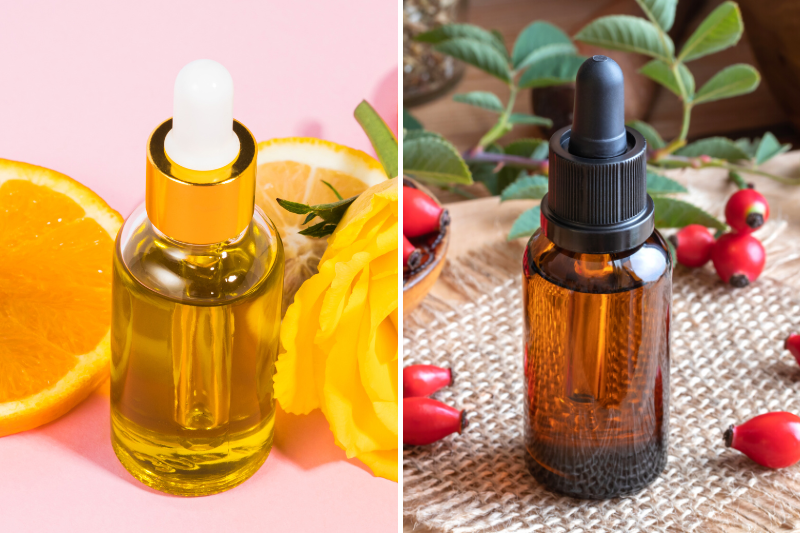Are you interested in learning the best vitamin c oil for face use? Then you have come to the right place!
Vitamin C, when applied topically, is claimed to be one of the best skincare products available for anti-aging and a bright, glowing complexion. Though most people get vitamin C in their diet, many apply it topically to reap the most benefits.
There have been numerous claims that various skincare oils contain high levels of vitamin C. Carrier oils like jojoba oil and rosehip oil and essential oils like orange and lemon have gained a reputation for this. These oils have gained popularity due to these claims, with many choosing to include them as part of their skincare regime.

But how true are these claims, and do carrier oils provide vitamin C? Are you better off sticking to a vitamin C serum?
In this guide, I will take you through all you want to know about oils with vitamin c. Answering questions like do oils contain vitamin c? Can you use vitamin c oil for scars? Can you use vitamin c oil for acne scars? And more!
Keep reading to learn more about face oils with vitamin c!
Benefits Of Vitamin C Oil For Face And On Your Skin
Before we discuss if there are oils that contain vitamin C, let’s discuss the benefits of vitamin C on the face. You can purchase products like vitamin C supplements or Vitamin C serums that we know deliver vitamin C to the skin. Below, I have listed a few benefits of vitamin C for the face and skin.
Can Help Redness And Scarring
Vitamin C can reduce redness on the face and help reduce the appearance of acne scarring. However, there is not much evidence to say vitamin C is an effective acne treatment.
Certain brands that sell vitamin C serums include other ingredients to increase the effectiveness of treating acne. I have listed one of these products that you can purchase later in this guide.
Brightens The Skin
Vitamin C can potentially reduce hyperpigmentation and smooth the surface of the skin which both help brighten the skin.
Evens Skin Tone
As mentioned previously, vitamin C can reduce pigmentation on the skin and smooth the surface of your skin which in turn helps to even skin complexion.

Can Reduce Sun Damage
When the skin is exposed to too many UV rays, it can reduce the level of vitamin C in the skin. Vitamin C has also been shown to be lower as the skin matures. Vitamin C is high in antioxidants which can help to regenerate skin cell damage.
Promotes Collagen Production
Vitamin C can help increase the levels of collagen in the skin. Collagen decreases as our skin ages, leading to wrinkles and fine lines. Vitamin C is a trusted product to help with this skin concern.
Can Be Used By Most Skin Types
Vitamin C is known to be a safe product for the skin. Most skin types can topically apply vitamin C over large periods of time with no reactions.
However, vitamin C does have the potential to cause mild skin irritation when the concentration is high. I recommend sticking to a vitamin C with a concentration of around 10-20% to avoid the risk of irritation.
It is always a good idea to perform a patch test before applying any new product all over the skin, especially for sensitive skin types.
Are There Oils With Vitamin C?
So, are there carrier oils with vitamin c? To put it simply, vitamin C is not a fat-soluble vitamin, it is only soluble in water and, therefore, cannot exist within an oil.
There are many claims that carrier oils like argan oil, rosehip oil and jojoba oil contain levels of vitamin C. This is true for the fruit and seeds pressed for their oils. However, because vitamin C is water-soluble, it is not found within the oils.
It has also been touted that essential oils like lemon and orange contain vitamin c. Again, this is untrue as vitamin C is water soluble.
Carrier Oils High In Vitamin C
Although many claims on the internet say that carrier oils can contain high amounts of vitamin C, this is not true. Jojoba oil and vitamin C? Argan oil, vitamin C? Vitamin C and rose oil; these products are commonly thought to contain levels of vitamin C. Unfortunately, carrier oils and essential oils do not contain vitamin C because they are fat-based, and vitamin C is water-soluble.
It is a nice idea, however, to include a carrier oil and a vitamin C serum in your skincare routine. Carrier oils are known for their high levels of essential fatty acids, antioxidants and fat-soluble vitamins that can deeply hydrate, soothe and soften the skin. If you are looking for a combination of hydration, brightening and evening skin complexion, combining these products is a good idea. Just make sure to apply them separately.

How To Best Apply Vitamin C Oil For Skin
Because vitamin C is not present in oils, I recommend using a vitamin C serum. I have a few of my favorites in the next section of this guide.
To Apply Vitamin C serum, follow the steps below:
- Wash the skin with your favorite cleanser and tone the skin if you wish
- Apply the vitamin C serum by applying a few drops to the palm of your hand and dabbing it onto the face until well absorbed
- Moisturize once your vitamin C serum has been absorbed
Note: You can also choose to use carrier oils alongside your vitamin c serum. For example, rosehip oil and vitamin C together.
Vitamin C serum and rosehip oil can be used at alternate times of the day, and this is a popular combination of products on the skin. Vitamin C serum is typically applied 1-2 times daily for best results, and a carrier oil like rosehip is applied once per day.
Best Vitamin C Oil For Face
Here, I have listed 3 of my favorite Vitamin C serums for the face:
1. TruSkin Vitamin C Serum
TruSkin vitamin C serum is an affordable vitamin C serum that is very popular among its users. It helps with anti-aging, skin brightening, dark spots, and under-eye circles and can improve wrinkles.
Containing ingredients like witch hazel, vitamin E, jojoba oil and botanical hyaluronic acid, it is a great option for those looking for a high-quality vitamin C serum that won’t break the bank.
2. Tree of Life Vitamin C Serum
Tree of life vitamin C serum is another affordable and popular vitamin C serum. It can help smooth the skin, visibly brighten it, reduce dark spots, and hydrate and smooth it. It has been made to suit all skin types and skin tones, and a little goes a long way.
3. Eva Naturals Vitamin C Serum
Eva Naturals Vitamin C serum is the most affordable in this list and another super popular vitamin C serum. This vitamin C serum boosts collagen production, reduces fine lines and wrinkles, helps acne and other skin conditions, helps with dark spots and more! Ingredients included in this formula include hyaluronic acid, turmeric and alpha arbutin.
Vitamin C And Rosehip Oil Together?
Rosehip seed oil and vitamin C together?
Rosehip oil and vitamin C together can work wonders on the skin. However, because rosehip oil is oil-based, I recommend applying these products separately rather than mixing them. It all depends on your personal skin needs.

Rosehip oil contains essential fatty acids, antioxidants, vitamin A and more; rosehip oil targets skin problems like dehydration and helps lock moisture into the skin. Vitamin C serums work by targeting dark spots, uneven complexion and pigmentation. So if these sound like problems you want to address, this combination may be for you.
Rosehip oil contains a good amount of vitamin A, a fat-soluble vitamin, and the mix of vitamins A and C can be great for the skin.
Conclusion
Vitamin C is a great product for the skin and can help to address several skin concerns. However, vitamin C cannot exist within an oil as it is a water-soluble ingredient. Vitamin C serum can work wonders paired with a carrier oil.
I hope you have enjoyed this guide discussing oils with vitamin C and I hope I have answered any questions you’ve had regarding this.
You can also read about the best carrier oil for sensitive skin here or find all more DIY beauty recipes here.






Comments are closed.